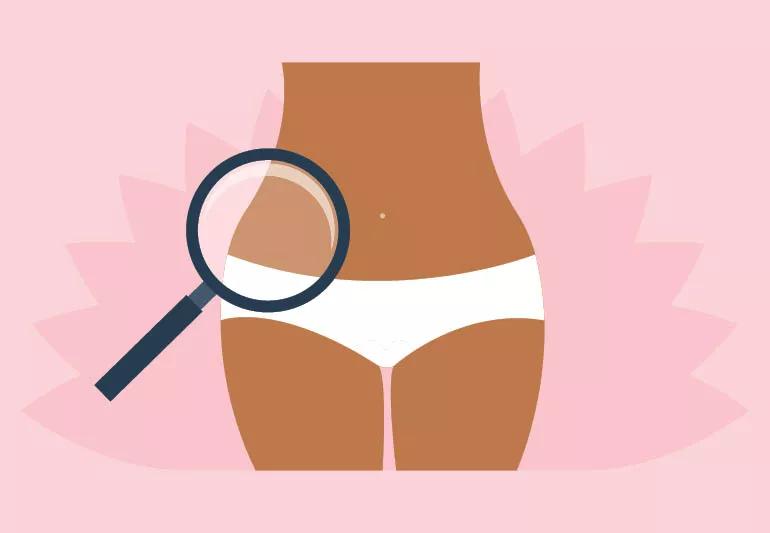How to make sure you’re getting the most appropriate health care

Image content: This image is available to view online.
View image online (https://assets.clevelandclinic.org/transform/40af28e8-d95b-4a22-bcc9-19ad66cffb96/21-HHB-2137722-YouFirst-Article-Images_take-care-pap-test_jpg)
An illustration of a magnifying glass over a woman.
Do you know the difference between a Pap test and a pelvic exam? Many women think they are the same thing, but there are important differences between the two. Women’s health specialist Dana Leslie, CNP, explains.
Advertisement
Cleveland Clinic is a non-profit academic medical center. Advertising on our site helps support our mission. We do not endorse non-Cleveland Clinic products or services. Policy
A Pap test is a medical screening to detect any changes in cells on the cervix.
Your doctor performs the screening by using a small plastic spatula and brush to collect cells from your cervix, which connects your uterus to your vagina. A specially trained person then examines the cells under a microscope in a laboratory to look for any abnormalities.
“A Pap test is one of the most reliable and effective cancer screenings,” says Leslie. “It can find precancerous changes on the cervix that can be treated before cancer develops, or early cancer when it’s most treatable,” she says.
Women should start obtaining Pap tests at age 21 with a three-year interval between screenings.
At age 30, if you have a normal Pap test and a negative human papillomavirus (HPV) test, you can space out your Pap tests to every five years. If results are normal your whole adult life, you may stop at age 65, but still should have a periodic pelvic examination especially if there are any symptoms.
“Many women are surprised to learn that most women do not need a Pap test every year,” says Leslie. “This is to avoid over-screening women, which results in unnecessary health costs and creates the potential for false positives,” she adds. False positives are test results that erroneously indicate abnormalities and can cause needless anxiety.
Advertisement
However – and this is important — if you are a DES daughter (a woman exposed prenatally to DES), are HIV-positive, or have high-risk precancerous changes on Pap tests, these screening guidelines do not apply to you. Be sure to talk it over with your doctor about the best time for you to have a Pap test. If you receive an abnormal Pap test result, be sure to schedule a follow-up appointments with your physician.
During a pelvic exam, your doctor looks for medical problems in your pelvis, vagina and the pelvic floor — the area that your hip bones encompass. Your doctor will examine your external genitalia, vagina and pelvic organs as well as your pelvic muscle floor strength.
Leslie says that many women don’t need a pelvic exam every year. But when it takes place, it’s part of your annual well-woman visit with your healthcare provider.
Be sure to discuss with your provider whether you need a pelvic exam during your well-woman visit. Leslie says you should have a pelvic exam if you have any concerns about:
“Some women request a pelvic exam because they have personal concerns that they want to discuss with their physician and not the person scheduling the appointment,” Leslie says. She says these can include sexual problems, pain, and/or bladder and bowel leakage.
The pelvic exam can pave the way toward counseling or treatment of these concerns. A pelvic exam may also uncover medical conditions that are producing unreported or unnoticed symptoms.
Even if a woman does not need a pap and/or a pelvic exam, she should still see her medical health provider every year.
But the bottom line: Be sure to see your physician every year for a well-woman visit. Ask whether you should have a pelvic exam — and talk with your doctor about whether and when a Pap test is appropriate for you. Then be sure to follow up on any abnormalities in the pap smear.
Advertisement

Sign up for our Health Essentials emails for expert guidance on nutrition, fitness, sleep, skin care and more.
Learn more about our editorial process.
Advertisement
Getting the right flange fit can make pumping breast milk more comfortable and effective
A flexible pumping schedule, the right gear and a few smart habits can make pumping at work smoother and more successful
It’s important to angle it toward your rectum or back, along the natural curve of your vaginal canal
To help manage symptoms, switch to more absorbent period products, make healthy lifestyle changes and explore treatment options
Yes, you can pee with a tampon in; no, they won’t stretch out your vagina or make cramps worse!
Estrogen loss contributes to bone loss, which significantly raises your risk of osteopenia and osteoporosis
The little blue pill might help with physical arousal, but there are better treatments for low libido in women
For large breasts, wearing a bra may provide support that helps alleviate back pain — but if you’re comfortable without one, go for it!
Prioritize your health by managing stress, strengthening your social connections and getting quality sleep
Bolsters, blankets, pillows and blocks can offer extra support, stability and comfort
Allergies, postnasal drip, asthma or reflux could be to blame for a cough that won’t quit